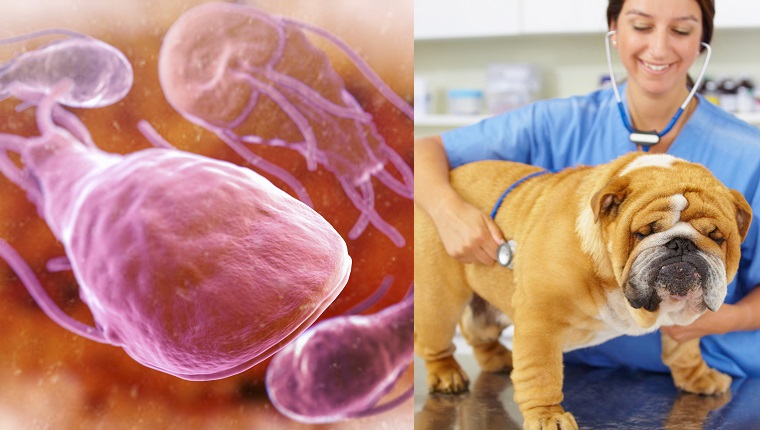My Dog Has Giardia – What Now?

What is Giardia?
Giardia is a microscopic parasite that is infectious to both humans and pets. These parasites are found living in the environment and can stay in your dog’s intestines for up to 12 days before it appears in their stool.
How can my dog contract giardia?
Giardia has to be ingested in order for the parasite to get into the intestines. Your dog can contract Giardia by either eating or drinking something has been contaminated by affected feces. This can be more direct, like eating poop, or less direct, like drinking from a puddle or pond. Animals like raccoons, squirrels, rats, bunnies, and deer, can all contract and transmit Giardia.
What are the signs of giardia?
Many dogs will show no symptoms of Giardia, and can spread the parasite unknowingly. This is why it is important for your dog to have a fecal test every year at their vet office. Other dogs can experience a range of mild to severe symptoms that include:
- Foul-smelling diarrhea
- Blood or mucus in stool
- Gas
- Nausea
- Vomiting
- Weight loss
- Appetite loss
- Abdominal Pain
- Lethargy
Debilitated or geriatric dogs, and those with incompetent immune systems, are at an increased risk for complications, including death.
How is Giardia treated?
If you suspect your dog has Giardia, whether they are showing signs or were in contact with an infected dog, you should let your veterinarian know right away. Your pup will be given medications to treat bacteria and parasites, and instructions on how to keep your household safe until the parasite has resolved. If your dog has been showing symptoms that won’t resolve, they may need to be hospitalized to prevent further complications.
Living with giardia
If your dog has Giardia, there are many precautious you should take at home:
- Dogs with Giardia should be bathed 1 – 2 times a week to remove cysts from the fur and prevent re-infection
- Any dog beds, bowls, toys, or things the infected dog came into contact with should be washed
- Wash your hands thoroughly after picking up poop (always!)
- Don’t allow your dog to lick your face (always!)
- All pets diagnosed with Giardia should be re-tested two to four weeks after completion of treatment
- For environmental disinfection, you can use chlorine bleach at 1:32 or 1:16 dilutions, or 1-2 cups in a gallon of water (60-120 ml/L). Lysol has also been reported as effective in killing the cysts
- Giardia cysts are susceptible to drying, so try to keep your environment as dry as possible
Preventing Giardia
There currently aren’t any vaccines or medications that can prevent Giardia, but managing your dog’s environment isn’t as hard as it sounds! Here are some tips to prevent this parasite infection:
- Make sure your dog only drinks clean water; Steer clear of puddles, bring bottled water to dog parks and on hiking tips, and skip communal dog bowls you might find outside of stores
- Come to terms with your poop-eater. If you know your dog eats poop, whether from dogs, bunnies, or deer, they need to be supervised more closely when outdoors
Giardia in doggy daycare
Canine To Five provides fresh water for all dogs throughout the day and has a professional cleaning crew at night, but if you have a dog who enjoys eating poop, it is possible for them to transmit or contract Giardia at doggy daycare if an infected dog is unknowingly present AND your dog happens to eat their poop specifically 😅 Whether or not your dog is a known poop-eater, it is more common for dogs to contract Giardia by drinking contaminated water from a puddle on a walk, or eating bunny poop in your own backyard. Giardia outbreaks are not something our facility has encountered, but we have had reported cases on occasion. Dogs with Giardia must steer clear of Canine to Five and any communal dog spaces until they’ve had a negative fecal test.


